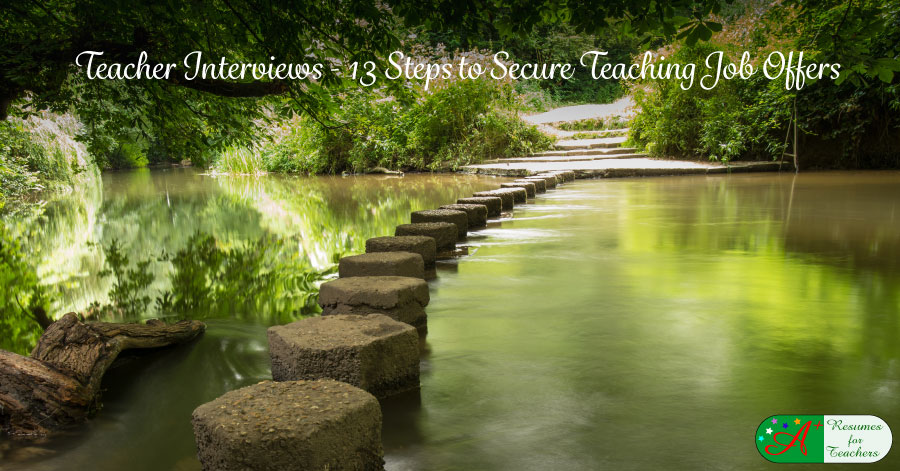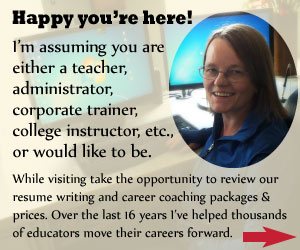Teacher Interviews - 13 Steps to Secure Teaching Job Offers
Are you practicing and preparing for teacher interviews? Good! Preparation is the key to interviewing in education, or any profession.
The teacher who gets the teaching job may not necessarily have the most training or experience. However, they may be the candidate who knows HOW to get a job.
Successful interviewing for a teaching job is a skill – it's like marketing a service. That service is the value you can bring to a school district.
If I could give you one word of advice for your teaching interview, it would be, "Be genuine." This is never more important than in the job hunting process. Communicate your authenticity – the real you.
Examine your best teacher skills and attributes and think about HOW to sell yourself to the school district.

13 Interviewing Tips to Clinch Your Next Teacher Interview
1. Research the School District or Organization
I can't stress the vital importance of researching and studying the school or business where you will be interviewing.
Find out as much as possible about their educational philosophy, key personnel (Principal, Secretary, Curriculum Development Supervisor, Superintendent, current problems, new curriculum initiatives, parents involvement).
If you can communicate to the school representative(s) how you can help solve their problems, you are that much closer to getting a job offer and hired.
2. Pinpoint Interview Weaknesses and Work Diligently to Improve Your Technique
A video interview is a powerful self-assessment tool. Are you confident, positive, or looking the interviewer in the eyes?
Or, are you fidgety, speaking in a low, monotone voice, and looking around the room?
Or egads – slumping in your chair! Practice answering tough interview questions.
3. Dress for Interview Success.
Make a favourable first impression. Clothes should be pressed and crisp, and skirts below the knees. Don't wear cologne or perfume and no flashy accessories. Shine your shoes, as many candidates forget to do so. Read more about how to dress properly for an interview for a teaching job.
4. Firmly Shake Hands with the Interviewer(s) and Don't Take a Seat Until Asked
With these gestures, you are making your first impression. The first impression is so influential it could have more sway than any facts you present in your teacher interview, according to a University of Toronto study. Sit up straight, and always maintain eye contact with the interviewer(s).
5. Prepare and Bring Necessary Documentation
Bring at least three copies of your professionally prepared resume, as well as a list of references on matching letterhead. A well-prepared teacher will have their full teaching portfolio on hand, with copies of teaching certificates and licenses.
If asked to supply them, you will not only impress with your preparedness but also avoid being moved to a pool of pending job applications.
6. Practice Speaking Out Loud with a Friendly and Professional Voice
Confidently communicate in a confident and positive manner. Make sure you show passion for teaching and sharing knowledge.
Avoid hollow statements: I am very passionate about helping children learn. Instead, demonstrate your passion for teaching. Did you work weekends to implement new learning technology? Or develop and implement a new teaching approach for children with autism?
7. Maintain a Professional Image Before, During, and After the Teaching Interview
Before you land your first teacher interview or you have sent out a resume, conduct due diligence on yourself. Social media is the biggest source of evidence of unprofessional behavior.
Delete the photos of you and your friends drinking yourselves 'under the table' on your mid-term trip to Florida – even if it was taken 15 years ago while you were in college. Make the messages with your cousin with the leathers and spikes private.
Delete your less than flattering comments on the presidential candidates. You want to ensure your social media image sets an exemplary example for your students.
8. Relax and Be Yourself, But Don't Forget...
The person sitting on the other side of the interview desk could be your future supervisor.
Research your interviewer in advance, and ask interview questions they can answer.
What information or tips can you share to discretely show you can help them do a better job?
If you have just come from a teacher interview at the district level, share the latest news with them, if relevent. These actions will show her that you will be a source of support and help them do her job better.
9. Tailor Responses to Match the School's Requirements
Allow the interviewer to describe the education position and its responsibilities early in the interview. Then you can apply your accomplishments specifically to that position and the needs of the district. For example, they may indicate there is a problem with low reading scores. So address this issue when you speak about your strengths. Don't just say you are excellent at increase reading scores; go on to explain how you did this in the past.
10. Ask Relevant Questions During Your Teacher Interview.
Try to establish two-way communication - this will help to develop a rapport with the interviewer(s). If you are both specialists in primary education, ask interview questions that may spark an interesting conversation – but only if led by the interviewer. Share the latest, advanced teaching methods. Don't make the mistake of thinking you are a 'know it all'.
11. Send a Thank You to Show You're Courteous and to Communicate Your Value
Always send a thank you letter right after the interview. Consider a follow-up letter if you haven't heard back in a reasonable time. Ideally, include value added information in these letters. If you discussed innovative K-12 reading lessons, attach the successful program you developed. Directly demonstrate competencies you were asked about in the interview.
12. Always Maintain Professionalism in Informal Discussions.
In addition to the formal teacher interview, a prepared candidate will have a script prepared for informal meetings. In the business world, most jobs are landed through social networking. Teachers should also strive to take advantage of this model. While attending district events, teacher recruitment events and so on, you are bound to have informal conversations with educators you would like to work for.
You should be subtle but effective and direct:
"Developing and implementing the new K-12 reading program has been one of the most rewarding teaching experiences of my career."
Do you feel the K-12 Excellence Program could help your district? If you would like more details about my implementation, please do not hesitate to contact me.
Never bad mouth your present or former supervisor or school in a conversation or interview for a teaching position. Limit your comments to what is necessary.
13. Practice Boosts Self-esteem - Confidence Lands Job Offers
Understand that nervousness is normal. By allowing yourself to be nervous, you will become more relaxed and maintain a calm appearance.
Review teacher interview questions and answers online or with friends and colleagues to ensure you are prepared for any question. We have interviewing eBooks available at our eBook career store.
Confident teacher applicants have been drilled themselves interview questions until mastery in achieved.
Use our interview coaching service to gain confidence and get the results you need by being thoroughly prepared.
Need help with your resume or any other job search documents visit our services and pricing page.
If you require more information or have any questions - Contact Candace at A+ Resumes for Teachers by clicking here or call toll-free 1-877-738-8052.

